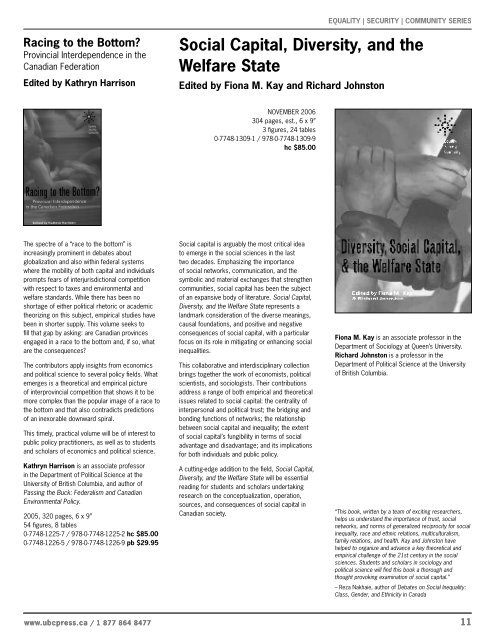The Future of Canada's Water - UBC Press
The Future of Canada's Water - UBC Press
The Future of Canada's Water - UBC Press
Create successful ePaper yourself
Turn your PDF publications into a flip-book with our unique Google optimized e-Paper software.
EQUALITY | SECURITY | COMMUNITY SERIES<br />
Racing to the Bottom?<br />
Provincial Interdependence in the<br />
Canadian Federation<br />
Edited by Kathryn Harrison<br />
Social Capital, Diversity, and the<br />
Welfare State<br />
Edited by Fiona M. Kay and Richard Johnston<br />
NOVEMBER 2006<br />
304 pages, est., 6 x 9”<br />
3 figures, 24 tables<br />
0-7748-1309-1 / 978-0-7748-1309-9<br />
hc $85.00<br />
<strong>The</strong> spectre <strong>of</strong> a “race to the bottom” is<br />
increasingly prominent in debates about<br />
globalization and also within federal systems<br />
where the mobility <strong>of</strong> both capital and individuals<br />
prompts fears <strong>of</strong> interjurisdictional competition<br />
with respect to taxes and environmental and<br />
welfare standards. While there has been no<br />
shortage <strong>of</strong> either political rhetoric or academic<br />
theorizing on this subject, empirical studies have<br />
been in shorter supply. This volume seeks to<br />
fill that gap by asking: are Canadian provinces<br />
engaged in a race to the bottom and, if so, what<br />
are the consequences?<br />
<strong>The</strong> contributors apply insights from economics<br />
and political science to several policy fields. What<br />
emerges is a theoretical and empirical picture<br />
<strong>of</strong> interprovincial competition that shows it to be<br />
more complex than the popular image <strong>of</strong> a race to<br />
the bottom and that also contradicts predictions<br />
<strong>of</strong> an inexorable downward spiral.<br />
This timely, practical volume will be <strong>of</strong> interest to<br />
public policy practitioners, as well as to students<br />
and scholars <strong>of</strong> economics and political science.<br />
Kathryn Harrison is an associate pr<strong>of</strong>essor<br />
in the Department <strong>of</strong> Political Science at the<br />
University <strong>of</strong> British Columbia, and author <strong>of</strong><br />
Passing the Buck: Federalism and Canadian<br />
Environmental Policy.<br />
2005, 320 pages, 6 x 9”<br />
54 figures, 8 tables<br />
0-7748-1225-7 / 978-0-7748-1225-2 hc $85.00<br />
0-7748-1226-5 / 978-0-7748-1226-9 pb $29.95<br />
Social capital is arguably the most critical idea<br />
to emerge in the social sciences in the last<br />
two decades. Emphasizing the importance<br />
<strong>of</strong> social networks, communication, and the<br />
symbolic and material exchanges that strengthen<br />
communities, social capital has been the subject<br />
<strong>of</strong> an expansive body <strong>of</strong> literature. Social Capital,<br />
Diversity, and the Welfare State represents a<br />
landmark consideration <strong>of</strong> the diverse meanings,<br />
causal foundations, and positive and negative<br />
consequences <strong>of</strong> social capital, with a particular<br />
focus on its role in mitigating or enhancing social<br />
inequalities.<br />
This collaborative and interdisciplinary collection<br />
brings together the work <strong>of</strong> economists, political<br />
scientists, and sociologists. <strong>The</strong>ir contributions<br />
address a range <strong>of</strong> both empirical and theoretical<br />
issues related to social capital: the centrality <strong>of</strong><br />
interpersonal and political trust; the bridging and<br />
bonding functions <strong>of</strong> networks; the relationship<br />
between social capital and inequality; the extent<br />
<strong>of</strong> social capital’s fungibility in terms <strong>of</strong> social<br />
advantage and disadvantage; and its implications<br />
for both individuals and public policy.<br />
A cutting-edge addition to the field, Social Capital,<br />
Diversity, and the Welfare State will be essential<br />
reading for students and scholars undertaking<br />
research on the conceptualization, operation,<br />
sources, and consequences <strong>of</strong> social capital in<br />
Canadian society.<br />
Fiona M. Kay is an associate pr<strong>of</strong>essor in the<br />
Department <strong>of</strong> Sociology at Queen’s University.<br />
Richard Johnston is a pr<strong>of</strong>essor in the<br />
Department <strong>of</strong> Political Science at the University<br />
<strong>of</strong> British Columbia.<br />
“This book, written by a team <strong>of</strong> exciting researchers,<br />
helps us understand the importance <strong>of</strong> trust, social<br />
networks, and norms <strong>of</strong> generalized reciprocity for social<br />
inequality, race and ethnic relations, multiculturalism,<br />
family relations, and health. Kay and Johnston have<br />
helped to organize and advance a key theoretical and<br />
empirical challenge <strong>of</strong> the 21st century in the social<br />
sciences. Students and scholars in sociology and<br />
political science will find this book a thorough and<br />
thought provoking examination <strong>of</strong> social capital.”<br />
– Reza Nakhaie, author <strong>of</strong> Debates on Social Inequality:<br />
Class, Gender, and Ethnicity in Canada<br />
www.ubcpress.ca / 1 877 864 8477 11













